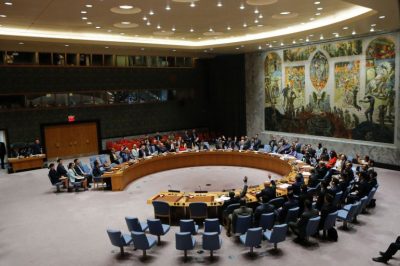Multipolar Sanctions on North Korea: Sell-Out or Strategic?

A lot of people in the Alternative Media community were taken aback by Russia and China’s decision to go along with the US-led UNSC sanctions on North Korea, especially considering that it was undertaken in the context of the US recently passing more anti-Russian sanctions and even threatening to sanction China too, which has created the perception that both countries “sold out” to the US. It just doesn’t make sense to some that these two multipolar Great Powers, who are presumably against the so-called “New World Order”, would do this. The reality, as it usually turns out to be, is a lot more complex than the simplistic arguments going around social media, and therefore deserves further elaboration so that individuals can independently make their minds up about what happened and why.
Before going any further, an important clarification needs to be made – although Russia and China are both multipolar Great Powers, they seek to gradually and stably reform the existing world order, not radically and chaotically change it like some so-called “super patriotic” pundits want to pretend. It’s the US which regularly throws global affairs into uncertainty in the hopes of destabilizing its rivals and carving out strategic inroads amidst the chaos, not Russia and China which prefer to engage in their long-term planning under conditions of global predictability. Given these strategic determinants influencing their decision makers, they’re already predisposed to disliking North Korea’s missile and nuclear tests, especially when they continue to occur in defiance of the existing UNSC sanctions that Moscow and Beijing approved of themselves.
Moreover, Russia and China won’t ever blindly support any state like North Korea just because the US is against it, nor will they ever be comfortable with such a country doing whatever it wants under these circumstances if its actions contribute to more instability. No value judgement is being expressed here, just a statement of facts about Russia and China’s state interests as gleaned from empirical evidence over the years. In the Northeast Asian context, North Korea’s missile and nuclear tests are creating the pretext to “justify” the US’ THAAD deployment to the peninsula, which Russia and China both consider as a latent threat to their nuclear second-strike capabilities with time, so from their perspective, it makes sense why they’d want to put multilateral pressure on North Korea to end these destabilizing activities.
What’s essentially occurred is that the US has succeeded in shaping the situation in such a way that Russia and China’s interests have largely converged with Washington’s own in tightening sanctions against North Korea, and that this is independent of the recent anti-Russian sanctions or the grandstanding threats to impose economic restrictions against China. The US exploited Russia and China’s strategic positions in favoring predictability and stability in convincing them to follow its lead in imposing new UNSC sanctions against North Korea, which also advances their own interests as described earlier and additionally provides a proverbial opening for them to work on the improvement of bilateral relations after falling into their current slump.
Whether one thinks that it was morally right or morally wrong, the fact remains that Russia and China approved the latest UNSC sanctions against North Korea because it corresponds to their grand strategic interests, not because they were forced to contradict them under American pressure.
The post presented is the partial transcript of the CONTEXT COUNTDOWN radio program on Sputnik News, aired on Friday Aug 11, 2017:
Andrew Korybko is an American Moscow-based political analyst specializing in the relationship between the US strategy in Afro-Eurasia, China’s One Belt One global vision of New Silk Road connectivity, and Hybrid Warfare.
Featured image is from the author.

